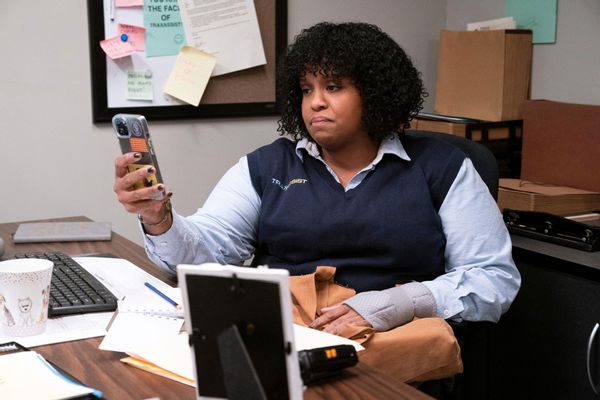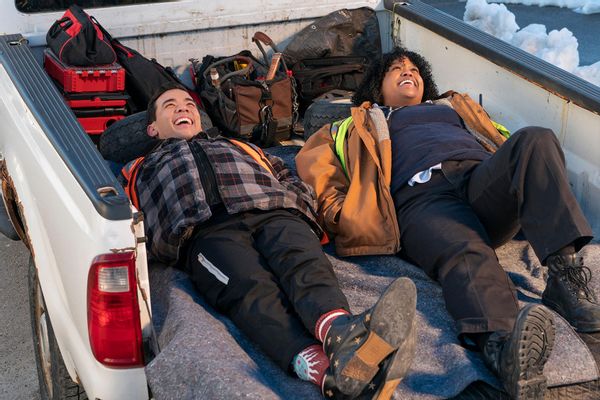
“How to Die Alone” existed long before JD Vance mounted his campaign against childless women, but the timing of its debut landing smack in the middle of the cat lady era couldn’t be better. The title sums up what misogynistic men believe to be the single woman’s greatest fear when the reality is that it's everyone's.
Natasha Rothwell’s Melissa confirms some of those assumptions as the show starts. She doesn’t have a pet at that point, to be clear. She doesn’t have much of anything going on besides a job at JFK driving travelers from gate to gate, enthusiastically spouting facts about the places they’re going. The tragedy is that she’s afraid to fly, which is both a true phobia and a metaphor for the rest of her life.
Mel is in a rut. She can’t trust any intimate relationships and feels alone despite being surrounded at work by friends who adore her. Her 35th birthday coincides with the double whammy of receiving an invitation to her ex-boyfriend Alex’s destination wedding and a knock into the afterlife, briefly, when a shelving unit she's just purchased and put together by herself falls on her.
Mel wakes in a hospital and is informed that she died for three minutes, which is a very practical way to inspire anyone to step up their business of living.
Rothwell created, stars in and serves as an executive producer in this show, one that mimics the basic architecture of many affirming shows or movies designated as simple, solidly entertaining and not-too-challenging comforts.
Those are not pejoratives but assets. One example that immediately and affectionately comes to mind is “Survival of the Thickest.” “How to Die Alone” occupies the same space in my heart and sensibilities as that comedy, and those who have seen “Survival” may recognize this as high praise.

Each is created by and stars two of the sharpest, funniest, and most performatively agile Black women in entertainment right now. Each is an easy joy, designed for comfort binges and the kind of repeat consumption some of us crave during cozy season.
Of course, the two series have enough details in common for that assessment to be easily misunderstood, so let’s acknowledge a few things. Both are about plus-size New Yorkers who are either single — which describes Rothwell’s Mel — or, in the case of Michelle Buteau's Mavis Beaumont in “Survival,” unexpectedly unpartnered.
Watching these eight episodes gives me the sense that Rothwell designed her show to go down smoothly instead of sitting heavily, achieved in part by blending gauzy, sparkly dream sequences into the mundane reality of being a broke woman in the big city.
Some aren’t even fantasies. One string of scenes that follows Mel’s hospital stay physicalizes the sensation of being on prescription painkillers by showing her and her co-stars break into choreographed body rolls and herky-jerky movements during normal conversations – a creative way of capturing the experience of being cognizant but not all there while mightily striving to maintain the appearance of being fine.
It’s in these creative production details that Rothwell’s imagination syncs splendidly with her acting talent. Rothwell initially captured our attention as the brash and unfiltered Kelli on “Insecure.” Some might recognize her from a much-circulated GIF featuring Kelli, at her most knowing. “You know what that is?” she asks, then answers by turning her fingers upward and expanding them like a daisy exploding into bloom while saying “Growth.”
As hilarious as she is in "Insecure," her work as eternally put-upon and forbearing masseuse Belinda on the first season of the anthology series “White Lotus” counts as one of the top performances of that year. Mike White affirms that by returning Rothwell to the cast for its upcoming third season.

Kelli showcases Rothwell’s dexterity with slapstick while Belinda demands restraint, a necessity to show off Jennifer Coolidge’s flailing goofery. "How to Die Alone" unleashes the breadth of Rothwell’s abilities, traveling a gamut of feelings as Melissa clumsily leaps from one risk to the next. Growth doesn't happen without setbacks or pivots, but Mel's near-death experience prods her to keep following the advice given by the woman sharing her hospital room. "Start doing something that scares you," the stranger tells her, and that advice leads her to make small steps and leaps — including some that aren't advisable.
It also splits the difference between feeling highly personal and broadly relatable, which is both an effect of Rothwell’s undeniable appeal and the many ways that Mel embodies the “we’ve all been there” sensation of taking refuge in playing it small and safe. By itself this could make “How to Die Alone” feel like a very lonely story but Rothwell’s collaborative cast and episode openers featuring unvarnished answers from people on the street fielding questions about life and love, buoy Mel’s adventures.
Conrad Ricamora (from Hulu’s “Fire Island”) meets Rothwell’s chemistry as Rory, the kind of best friend who can be a trap for an overly accommodating, low-self-esteem big girl (this is said from a place of experience). But there isn’t any more malice written into Rory than there is in Mel’s ex-boyfriend Alex (Jocko Sims). The writers make Mel’s mess the center of the story, which allows for a lot of comedy but plenty of understanding for those in her orbit, a few of whom get sucked into the gravity wells that open in her life.
This includes Mel’s brother Brian (“South Side” star Bashir Salahuddin) whose martyr complex leads him to cast her as the family screw-up, and her ridiculously tight office mate Patti (Michelle McLeod, an underappreciated delight), who doesn’t bother to hide her resentment for her co-workers. If there’s a breakout figure here, though, it may be Terrance, KeiLyn Durrel Jones’ sweet baggage handler who is Mel’s top advocate and a real estate holder in the Friend Zone.
That’s not always a bad thing – there remains a deficit of strongly written platonic friendships between men and women on TV. (One of the best ones is a highlight of Buteau’s “Survival.”) Rothwell writes their bond with expansion possibilities for future seasons, something the writers place a wager on by punctuating the season with a question mark which, while justifiable, flattens some of the fizziness that leads up to it.
Cliffhanger endings are a defining trait of streaming series, so this is not the worst sin, especially since the prevailing feeling of “How to Die Alone” is of wanting more. And this goes with what we know and enjoy about Rothwell, whether as a co-star or the main event. Amazing as her work is, Rothwell leaves open the possibility for Mel to be and do more – and earns the audience’s willingness to watch that bet pay off.
The first four episodes of "How to Die Alone" premiere Friday, Sept. 13 on Hulu.







